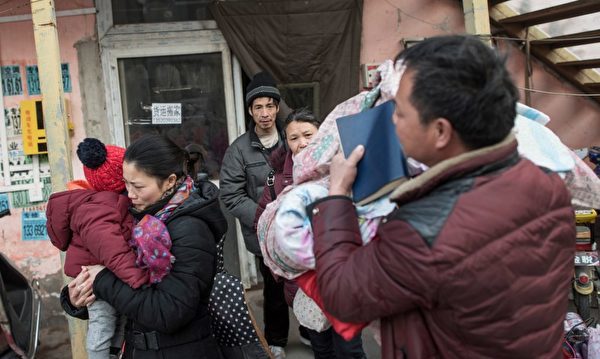[Epoch Times, April 8, 2022](Comprehensive report by The Epoch Times reporter Fang Xiao) Statistics show that the population growth rate of first-tier cities such as Beijing, Shanghai, and Guangzhou has generally slowed down. The resident population of Beijing dropped by 4,000 last year, marking the fifth consecutive year of negative population growth in Beijing. Mainland financial commentators pointed out that due to the narrow-mindedness of relevant policies, the population has fallen.
On April 8, the “Daily Economic News” reported that as of now, of the 24 cities with a GDP of trillions in mainland China, except for Shenzhen, the population data by the end of 2021 has been announced.
In the context of the mainland’s population growth of only 480,000 people last year, the regional population pattern is ushering in a new round of reshuffle. The population growth rate of first-tier cities such as Beijing, Shanghai and Guangzhou has slowed down significantly.
“Beijing, Shanghai and Guangzhou” (Beijing, Shanghai, Guangzhou) have 21.886 million permanent residents, 24.8943 million and 18.8106 million respectively. In terms of population growth, the newly added populations of Shanghai and Guangzhou were 10,700 and 70,700 respectively, while the resident population of Beijing dropped by 4,000. This is the fifth consecutive year that Beijing’s resident population has experienced negative growth, with a cumulative decrease of 68,000 in the past five years.
Tian Xueyuan, a member of the Chinese Academy of Social Sciences and a researcher, believes that the primary reason is the decline in the birth rate and the slowdown in natural population growth.
In 2021, the birth rates in Beijing and Shanghai will be 6.35‰ and 4.67‰, respectively, both lower than the national average of 7.52‰.
Although Guangzhou’s birth rate (population with registered household registration) remains at double digits (11.82‰), it has also dropped significantly compared to previous years. In terms of natural growth rate, Shanghai has a negative growth rate of -0.92‰, Beijing is only 0.96‰, and Guangzhou has a level of 6.26‰ (the registered population), which is also 2.68‰ lower than in 2020.
Last year, Guangzhou’s population growth suddenly fell below 100,000, hitting a new low in nearly 20 years. Population growth across Guangdong province has also slowed significantly. At the end of 2021, the permanent population of Guangdong was 126.84 million, an increase of 600,000 compared with the end of 2020, and the increase was directly “halved”. In comparison, the resident population of Guangdong will increase by 1.35 million in 2020.
For a long time, first-tier cities such as Beijing, Shanghai, and Guangzhou have been the places that mainlanders yearn for, especially for college graduates, who have made working and living in first-tier cities their first choice. People re-selected to develop in second- and third-tier cities, which was called “escape from Beijing, Shanghai and Guangzhou” by public opinion. Escape from Beijing, Shanghai and Guangzhou is a trend of thought among white-collar workers when housing prices in big cities remain high and living pressure continues to increase.
Recently, Zhang Jie, a mainland financial commentator and a researcher at the Beijing Knowledge Security Engineering Center, commented on the “Zhang Jie Finance and Economics Observation” program that the fall of Beijing’s population has a fatal impact on China’s overall situation. The so-called low-end population in Beijing (people who open small restaurants and wholesale stores) has a strong ability to survive, but they will never have a Beijing hukou, and the way for children to go to school is blocked. These populations had to leave Beijing.
Zhang Jie said that the relevant policies of the rulers are very narrow, for the sake of short-sighted interests and backward concepts, which are very unfavorable to the development of Beijing, and will have a significant strategic impact on the development of the entire country and the layout of the industry. The population decline from Beijing has seen an inflection point. For Beijing, what is needed is the population to grow and expand. China’s Beijing, Shanghai and Guangzhou should concentrate 60% of China’s population. The concentration of population has a huge role in promoting the development of the industry, the layout of the industry chain and the integration of various industries.
Some netizens commented on related topics, “There is a serious brain drain in the north.” “The north has already fallen, and now it’s becoming less and less interesting! The north has always been a prosperous area, but I didn’t expect it to be like this now. Is it development or development? Going backwards? Some people pretend to be asleep, but they can’t see it!” “It’s strange that the population does not decline due to the policy of high housing prices.”
Beijing’s expulsion of so-called “low-end population” is well known. Beginning in 2017, Beijing authorities began to clean up the “low-end population” living on the outskirts of Beijing on a large scale, demolishing their homes, closing small wholesale markets and factories, and forcing these people from all over China who came to Beijing to make a living to return to their places of origin. The CCP’s move has aroused strong dissatisfaction among the people, including the local people in Beijing.
Responsible editor: Lin Congwen#
